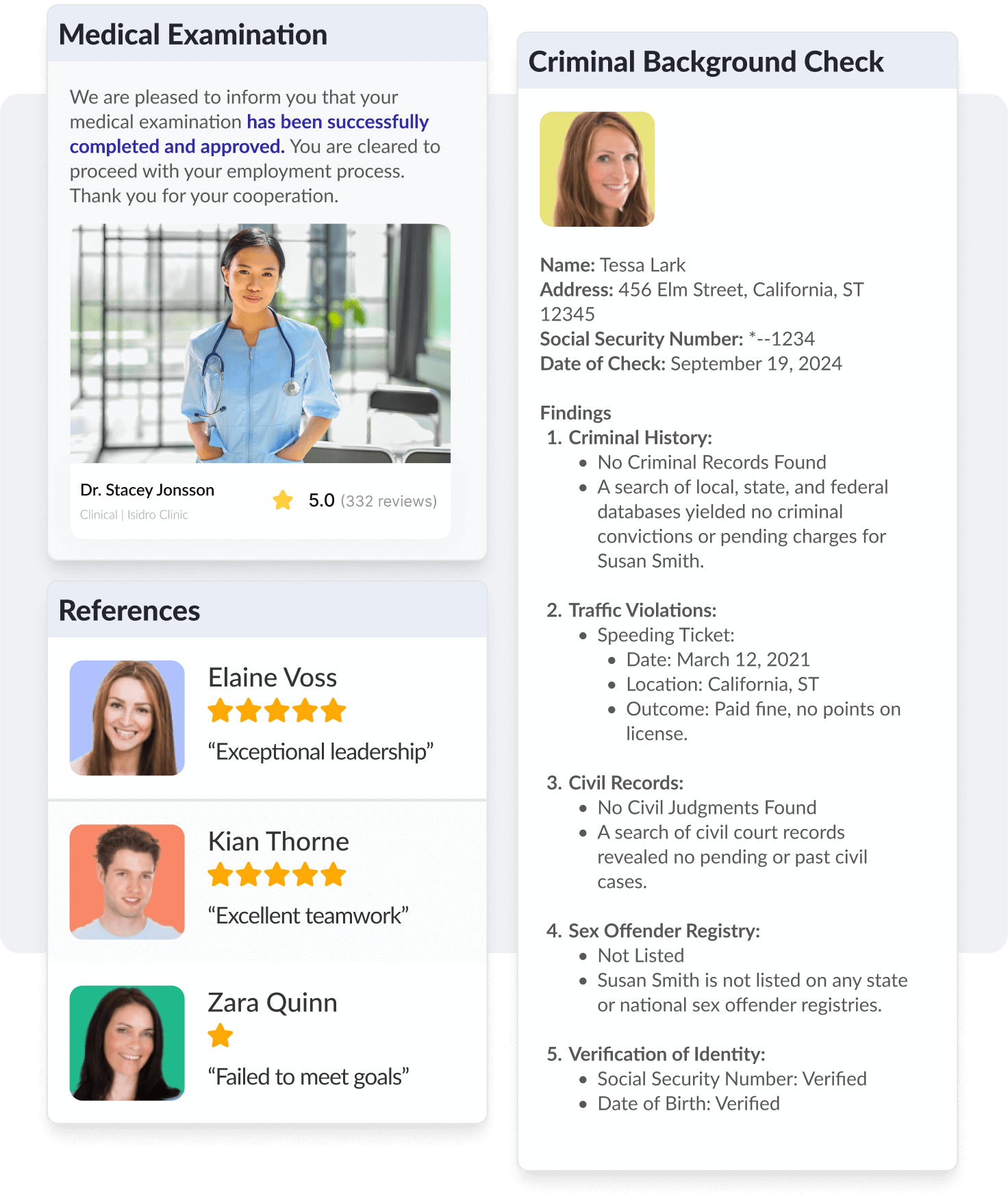
Example of How To Decline a Job Offer
Learn the best practices for respectfully rejecting a job offer while keeping connections strong. Includes customizable email templates for recruiters.

Hunting for a new role is often a full-time job in itself. From sifting through postings and submitting applications to going through multiple rounds of interviews, the process can feel exhausting as candidates wait to hear those five little words: “We want to hire you.”
But what if there’s a “but” at the end of that phrase? That’s the case with conditional job offers—an increasingly common step in hiring.
This guide explores what conditional offers of employment are, what applicants should expect if they receive one, and the steps needed to get the job.
A conditional job offer is an employment offer contingent on candidates meeting specific requirements before employment is finalized. Common criteria include background and credit checks, drug screenings, and obtaining or showing proof of insurance, certifications, etc.
For job seekers, it's crucial to understand that while a conditional job offer signals they’re a preferred candidate, employment is not yet guaranteed. The employer must still verify they meet all the qualifications and pass any required checks.

Employment and hiring laws vary based on country and region. However, generally speaking, a conditional job offer differs significantly from an unconditional job offer, where the position is immediately offered without additional requirements.
Here’s a quick overview of what job seekers should keep in mind to avoid prematurely submitting their resignations or withdrawing from consideration for other job openings:
Conditional Offer
Unconditional Offer
Requires candidate to meet certain conditions (e.g., background check, drug test) within a timeline.
No additional requirements. Job is offered outright.
Offer is not guaranteed until conditions are met.
Offer is guaranteed once accepted by the candidate.
Can be revoked at any time if conditions aren’t met or withdrawn for any non-discriminatory reason.
Cannot be revoked without legal cause once accepted.
Best Practices for Switching Jobs
Giving a current employer advanced notice (e.g., two weeks or longer, depending on your role) is a common courtesy that will preserve goodwill when exiting a role, and a future employer should understand and respect that.
With any job offer, candidates should ensure they have clarity about pay, benefits, start date, etc., before resigning from a job.

Conditional offers of employment serve as a protective measure for companies, particularly those in highly regulated industries (e.g., healthcare, financial, law enforcement) or that are hiring for roles where safety is a priority (e.g., drivers, heavy equipment operators).
By extending conditional job offers, organizations can let top candidates know they want them to join their team and gauge a candidate’s interest in moving forward based on the salary and benefits provided.
If the candidate wants to proceed, employers then have more time to navigate additional verification steps that don’t make sense on the front end of the hiring process. They also retain the flexibility to rescind the offer if the applicant doesn’t ultimately meet key requirements.
Requirements for conditional offers of employment vary depending on the industry and the role, but these offers often include contingencies, like:
Each of these conditions serves a specific purpose, whether it’s ensuring workplace safety, compliance with regulations, or confirming candidates’ qualifications for the position.

From an applicant's perspective, conditional offers of employment have benefits and drawbacks. The primary advantage is knowing they’ve been selected as the preferred candidate for the position. Additionally, conditional offers outline requirements, giving job seekers a clear path to securing the role and time to get certifications or licenses before starting the job.
Conditional job offers also present challenges. Employment isn’t guaranteed until the conditions are met. This uncertainty can cause anxiety for some candidates. Background checks or other verifications take time, which can delay the hiring process. And if applicants fail to meet requirements, the employer may withdraw the offer, leaving them back at square one in their job search.
Understanding the pros and cons of conditional job offers can help applicants prepare for possible complications and manage their expectations throughout the hiring process.

If you’ve gotten a conditional offer of employment, congratulations! You’re a top candidate, so take a few moments to celebrate.
However, your work isn’t done yet. Here are a few additional steps to ensure you secure the job:
Yes, in most countries and regions, a conditional offer is legally binding once it’s signed by both parties. That said, legally binding does NOT mean employment is guaranteed. A company can withdraw an offer (conditional or unconditional) for a variety of reasons, such as:
The reality is that employers can rescind a job offer legally in many cases, but most companies won’t withdraw an offer unless there’s just cause. They want to hire great candidates and don’t want to damage their reputation by acting in bad faith.
That said, there are exceptions. A candidate could consider legal action against a company if they can prove they've suffered economic or emotional harm or were subject to unfair hiring practices.

Receiving a conditional job offer of employment can be an exciting yet nerve-wracking experience. It’s important to understand what the conditions mean and how to navigate the process to secure the position.
Candidates should always take a step back and decide if they want the job and whether the employer’s conditions are reasonable. If not, negotiate or politely decline and move on.
But when the job and company feel like a great fit, carefully review the offer, meet the outlined conditions, and stay proactive in communication with the prospective employer. Being diligent at this stage of the hiring process will often transform a conditional offer into the next step in your career.
Failing to meet a requirement of a conditional job offer will likely result in the employer withdrawing the offer. Make sure you feel confident that you can fulfill the conditions before accepting. If situational issues arise (e.g., you’re delayed in getting a certification), communicate proactively. Potential employers will often work through unexpected delays.
Yes. Conditional offers of employment are contingent on candidates fulfilling requirements within the deadlines. Additionally, companies can withdraw offers due to other non-discriminatory reasons, such as cutbacks or restructuring. Be sure you and the employer are on the same page in terms of hiring and start dates before ending a job search or turning in your notice.
The timeline for meeting the conditions should be outlined in the offer letter. Be sure to ask questions to clarify specifics and communicate with the employer if there are unexpected delays.
Yes, 100%. Like any job offer, candidates can and should negotiate aspects of a conditional job offer. Negotiations can include salary, benefits, or requirements, conditions, and deadlines.
Modernize your hiring process with expert insights and advice.